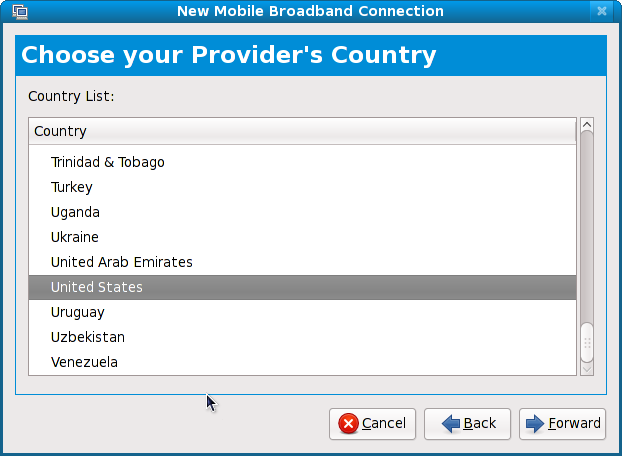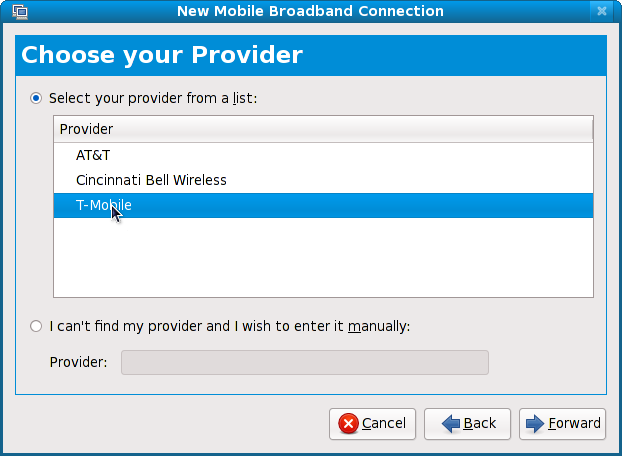No edit summary |
|||
| Line 34: | Line 34: | ||
== Scope == | == Scope == | ||
Work with hardware vendors (Novatel, Sierra, others) to release the specifications for the command protocol while the cards are connected | Work with hardware vendors (Novatel, Sierra, others) to release the specifications for the command protocol while the cards are connected. | ||
Most of the functionality in this feature is enabled by using ModemManager to do the hard | Most of the functionality in this feature is enabled by using ModemManager to do the hard | ||
work of talking to all kinds of modems. This requires changes to udev. | work of talking to all kinds of modems. This requires changes to udev. | ||
ModemManager centralizes all quirks in one place. | |||
== Test Plan == | == Test Plan == | ||
| Line 45: | Line 47: | ||
== User Experience == | == User Experience == | ||
Instead of a static icon while connected to a cellular network, the applet should show a signal strength meter. | Instead of a static icon while connected to a cellular network, the applet should show a signal strength meter. The applet should also allow the user to choose the GSM network that a specific connection should apply to, to facilitate easier roaming control. | ||
The initial setup of a mobile broadband connection is made easier by an assistant which has a database of known providers, plans, etc. | The initial setup of a mobile broadband connection is made easier by an assistant which has a database of known providers, plans, etc. | ||
| Line 68: | Line 70: | ||
== Dependencies == | == Dependencies == | ||
udev needs to be updated to ship the necessary rules for handling modems. | |||
ModemManager | |||
Possibly VMC or other projects to drive the cards over D-Bus instead of manually as NM does right now. | Possibly VMC or other projects to drive the cards over D-Bus instead of manually as NM does right now. | ||
| Line 79: | Line 84: | ||
== Release Notes == | == Release Notes == | ||
Fedora 12 includes NetworkManager 0.8, which | Fedora 12 includes NetworkManager 0.8, which now uses ModemManager for greatly improved support for mobile broadband connections. | ||
---- | ---- | ||
[[Category:FeaturePageIncomplete]] | [[Category:FeaturePageIncomplete]] | ||
Revision as of 01:49, 23 June 2009
NetworkManager Mobile Broadband Improvements
Summary
Extended support of mobile broadband cards in NetworkManager, including display of signal strength when connected, network scanning, network selection, etc.
Owner
- Name: Dan Williams
Current status
- Targeted release: Fedora 12
- Last updated: 2009-06-22
- Percentage of completion: 50%
Detailed Description
NetworkManager has basic mobile broadband card support (including mobile phones when connected via wired serial), but lacks some more useful functionality:
- scanning for available cellular networks (GSM only)
- selection of a cellular network (GSM only)
- show signal strength of currently connected cellular network
The support for setting up mobile broadband connections is also somewhat rudimentary. Dan has recently written about the improvements in this area, see his post Mobile Broadband Assistant makes it Easy.
Benefit to Fedora
These features are quite useful to users and sometimes necessary for easier roaming support when outside of your home country.
Scope
Work with hardware vendors (Novatel, Sierra, others) to release the specifications for the command protocol while the cards are connected.
Most of the functionality in this feature is enabled by using ModemManager to do the hard work of talking to all kinds of modems. This requires changes to udev.
ModemManager centralizes all quirks in one place.
Test Plan
Get wide testing from the NetworkManager community of these features with as wide a hardware sample as we can find.
User Experience
Instead of a static icon while connected to a cellular network, the applet should show a signal strength meter. The applet should also allow the user to choose the GSM network that a specific connection should apply to, to facilitate easier roaming control.
The initial setup of a mobile broadband connection is made easier by an assistant which has a database of known providers, plans, etc.
When you first insert your card, it shows up in the applet like this:

When you click that, you’ll get the Assistant’s intro page, which explains what information you will need:

The next pages asks for your country:

The final page summarizes what information you've entered:

Dependencies
udev needs to be updated to ship the necessary rules for handling modems. ModemManager
Possibly VMC or other projects to drive the cards over D-Bus instead of manually as NM does right now.
Contingency Plan
Ship without signal strength while connected; scanning and network selection don't block on external parties.
Documentation
Release Notes
Fedora 12 includes NetworkManager 0.8, which now uses ModemManager for greatly improved support for mobile broadband connections.


